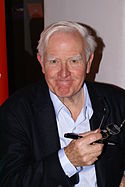John le Carre Quote
One more consideration also weighed with Smiley, though in his paper he is too gentlemanly to mention it. A lot of ghosts walked in those post-fall days, and one of them was a fear that, buried somewhere in the Circus, lay Bill Haydon's chosen successor: that Bill had brought him on, recruited and educated him against the very day when he himself, one way or another, would fade from the scene. Sam was originally a Haydon nominee. His later victimisation by Haydon could easily have been a put-up job. Who was to say, in that very jumpy atmosphere, that Sam Collins, manoeuvring for readmission, was not the heir elect to Haydon's treachery?For all these reasons George Smiley put on his raincoat and got himself out on the street. Willingly, no doubt - for at heart, he was still a case man. Even his detractors gave him that.
One more consideration also weighed with Smiley, though in his paper he is too gentlemanly to mention it. A lot of ghosts walked in those post-fall days, and one of them was a fear that, buried somewhere in the Circus, lay Bill Haydon's chosen successor: that Bill had brought him on, recruited and educated him against the very day when he himself, one way or another, would fade from the scene. Sam was originally a Haydon nominee. His later victimisation by Haydon could easily have been a put-up job. Who was to say, in that very jumpy atmosphere, that Sam Collins, manoeuvring for readmission, was not the heir elect to Haydon's treachery?For all these reasons George Smiley put on his raincoat and got himself out on the street. Willingly, no doubt - for at heart, he was still a case man. Even his detractors gave him that.
Related Quotes
About John le Carre
Le Carré's third novel, The Spy Who Came in from the Cold (1963), became an international best-seller, was adapted as an award-winning film, and remains one of his best-known works. This success allowed him to leave MI6 to become a full-time author. His novels which have been adapted for film or television include The Looking Glass War (1965), Tinker Tailor Soldier Spy (1974, 2011), Smiley's People (1979), The Little Drummer Girl (1983), The Night Manager (1993), The Tailor of Panama (1996), The Constant Gardener (2001), A Most Wanted Man (2008) and Our Kind of Traitor (2010). Philip Roth said that A Perfect Spy (1986) was "the best English novel since the war".
